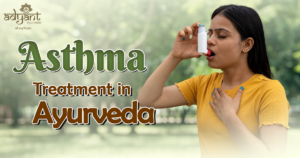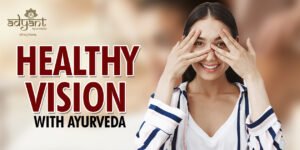Introduction:
Ayurveda for Dandruff involves scalp massages with herbal oils, which improve your scalp, reduce flakiness, and promote healthy hair. Dandruff and itchy scalp are common afflictions that can affect the health and appearance of our hair. These issues not only cause discomfort but can also lead to self-consciousness and a diminished sense of confidence. In the pursuit of a solution, many turn to Ayurveda – an ancient Indian system of medicine that emphasizes holistic well-being. This essay delves into the causes of dandruff and itchy scalp, the impact of hard water, and Ayurveda remedies to alleviate these issues. Additionally, it explores the consequences and infections associated with untreated dandruff, emphasizing the effectiveness of Ayurveda treatment for dandruff and itchy scalp at Adyant Ayurveda, a renowned Ayurveda hospital.
Table of Contents
ToggleCauses of Dandruff and Itchy Scalp:
-
- Dandruff is often linked to an overgrowth of the yeast-like fungus Malassezia on the scalp. This overgrowth can lead to increased shedding of skin cells, causing visible flakes.
-
- Dry scalp, a result of insufficient moisture, is a common cause of itchiness and dandruff. When the skin lacks hydration, it becomes prone to flakiness and irritation.
-
- This is a common inflammatory skin condition characterized by red, itchy, and flaky skin. It often affects areas rich in oil glands, such as the scalp, The Beard contributes to dandruff.
-
- Some individuals may experience dandruff and itching due to sensitivity or an allergic reaction to certain hair care products, including shampoos, conditioners, or styling products.
-
- Inadequate cleansing and infrequent washing of the scalp can lead to the accumulation of oil, dead skin cells, and product residue, creating an environment conducive to dandruff and itching.
Effects of Hard Water on the Scalp:
The impact of hard water on the scalp goes beyond dandruff. The minerals in hard water can create a film on the scalp, making it difficult for hair to absorb moisture. This can result in dry and brittle hair, further intensifying the itching sensation. The diminished moisture also weakens the hair follicles, leading to increased hair fall and compromised overall hair health.
Remedies to Combat Dandruff and Itchy Scalp:
Ayurveda offers a holistic approach to treating dandruff and itchy scalp, focusing on balancing the body’s doshas (Vata, Pitta, and Kapha). Herbal oils such as neem, tea tree, and coconut oil are known for their anti-fungal and anti-bacterial properties, helping to eliminate the root cause of dandruff.
Ayurveda treatment for dandruff and itchy scalp at Adyant Ayurveda may include medicated shampoos and hair masks containing ingredients like amla, shikakai, and bhringraj. These herbs are revered in Ayurveda for their nourishing and revitalizing properties, promoting overall hair health and preventing dandruff recurrence.
Role of Takradhara for dandruff and itchy scalp
Takradhara is an Ayurvedic therapy that involves a continuous stream of medicated buttermilk (takra) being poured onto the forehead in a rhythmic manner. While Takradhara is not specifically renowned for treating dandruff and itchy scalp, it has potential benefits for overall scalp health, indirectly contributing to the alleviation of these conditions. Here’s how Takradhara plays a role:
- Cooling Effect:
- Takradhara has a cooling effect on the body and mind. This cooling property can help pacify excess heat (Pitta dosha) in the scalp, which is often associated with conditions like dandruff and itching.
- Balancing Doshas:
- Ayurveda believes that an imbalance in the doshas, especially Pitta, can contribute to scalp issues. Takradhara is thought to balance the doshas, promoting harmony within the body, and potentially addressing the root cause of scalp problems.
- Hydration and Nourishment:
- The medicated buttermilk used in Takradhara contains nutrients that can nourish the scalp and hair. Adequate hydration and nourishment are essential for maintaining a healthy scalp and preventing issues like dryness and itching.
- Stress Reduction:
- Takradhara is a deeply relaxing therapy. Stress is considered a contributing factor to various skin and scalp conditions. By promoting relaxation and reducing stress, Takradhara may indirectly support scalp health.
Consequences and Infections of Dandruff:
Untreated dandruff can lead to various consequences, ranging from cosmetic concerns to more severe scalp infections. Social discomfort due to visible flakes on clothing can affect self-esteem, while persistent itching can cause skin damage and lead to open sores, creating an entry point for bacteria. In severe cases, untreated dandruff can contribute to conditions such as folliculitis, a bacterial infection of the hair follicles.
Adyant Ayurveda: The Beacon of Ayurvedic Hair Care:
Adyant Ayurveda stands as a beacon of excellence in the field of Ayurvedic medicine, particularly for hair care. The hospital employs experienced Ayurvedic practitioners who conduct thorough consultations to understand the unique constitution of each individual. Customized treatment plans are then devised, addressing not only the symptoms but also the underlying imbalances in the body.
The Ayurveda treatment for dandruff and itchy scalp at Adyant Ayurveda emphasizes lifestyle modifications, dietary changes, and stress management alongside herbal treatments. This holistic approach aims to create a harmonious balance within the body, promoting long-term relief from dandruff and itchy scalp.
Home Remedies to get rid of Dandruff and Itchy Scalp
- Lemon Juice: The acidity of lemon juice helps balance the pH of the scalp, reducing dandruff. Massage fresh lemon juice into the scalp and leave it on for 5-10 minutes before washing your hair.
- Coconut Oil and Tea Tree Oil Mask Combine coconut oil with a few drops of tea tree oil.Massage this mixture into your scalp and leave it on for at least 30 minutes before washing your hair .Coconut oil moisturizes, while tea tree oil has antimicrobial properties.
- Yogurt Hair Mask Yogurt contains probiotics that can help balance the scalp’s microbiome. Apply plain yoghurt to your scalp, leave it on for 20-30 minutes, and then wash it off. This can help reduce dandruff and soothe itchiness.
- Apple Cider Vinegar Rinse Mix equal parts of water and apple cider vinegar and use it as a final rinse after shampooing. Apple cider vinegar has antimicrobial properties that may help control dandruff.
Conclusion:
Dandruff and itchy scalp are not merely cosmetic issues; they are reflections of imbalances within the body. The Ayurvedic approach to treating these concerns, particularly at Adyant Ayurveda, offers a comprehensive and sustainable solution. By addressing the root causes through natural remedies and lifestyle adjustments, individuals can bid farewell to dandruff and welcome healthier, more resilient hair. In embracing the wisdom of Ayurveda, we unlock the secrets to not only beautiful hair but also a holistic sense of well-being.
FAQs
- How long does it take to see results with Ayurveda treatments for dandruff and itchy scalp?
- The timeline for results varies from person to person. Some individuals may experience improvement within a few weeks, while others may take longer. Consistency in following the prescribed Ayurvedic treatment plan, including lifestyle modifications, is crucial for long-term relief.
- Can Ayurveda be combined with conventional treatments for dandruff?
- It’s advisable to consult with a healthcare professional before combining Ayurvedic treatments with conventional ones. While Ayurveda offers natural remedies, individual health conditions and interactions with other treatments should be considered for a holistic approach.
- Is Ayurvedic treatment safe for all hair types?
- Ayurvedic treatments are generally considered safe for all hair types. However, individual variations exist, and it’s recommended to consult with an Ayurvedic practitioner to determine the most suitable treatments based on hair type and specific conditions.
- How important is diet in Ayurvedic treatment for dandruff?
- Diet plays a significant role in Ayurveda, and adjustments may be recommended based on an individual’s dosha imbalance. A balanced and nourishing diet can contribute to overall well-being and may aid in the effectiveness of Ayurvedic treatments.
- Are the home remedies mentioned suitable for regular use?
- Home remedies like lemon juice, aspirin treatment, and yogurt hair mask are generally safe for occasional use. However, individual skin sensitivities may vary, and it’s recommended to patch-test any new remedy and not overuse them. Consultation with a healthcare professional is advised for persistent issues.
- Can Ayurveda help prevent dandruff recurrence in the long term?
Yes, Ayurveda aims not only to treat the symptoms but also to address the underlying imbalances that contribute to dandruff. By incorporating lifestyle changes, dietary modifications, and herbal treatments, Ayurveda seeks to create a holistic balance in the body, reducing the likelihood of dandruff recurrence in the long term






